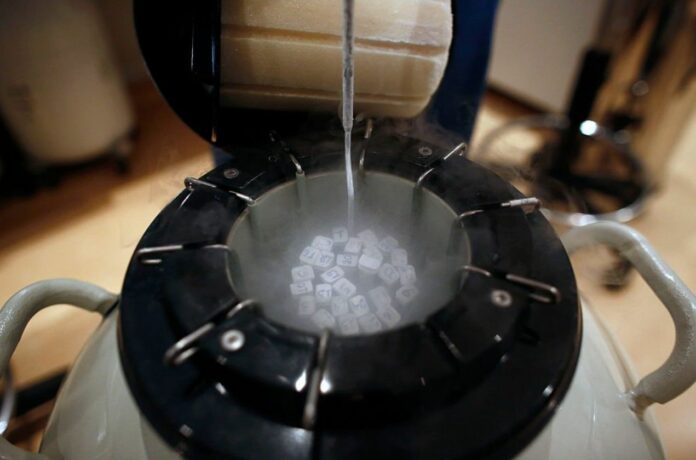A study published in the journal Hypertension found that getting pregnant from a frozen embryo could make the mother more likely to develop dangerous hypertensive disorders.
A new study published today in Hypertension suggests that Frozen-thawed Egg IVF or frozen embryos IVF (in vitro fertilization) may be linked to a 74% higher risk of hypertensive disorders during pregnancy.
Comparatively, the study found that pregnancies resulting from fresh embryo transfers – transferring the fertilized egg immediately after in vitro fertilization (IVF) as opposed to a frozen fertilized egg – and pregnancies resulting from natural conception had the same risk of developing a hypertensive disorder.
High blood pressure during pregnancy is often a sign of preeclampsia, a pregnancy complication that includes persistent high blood pressure that can put the health and life of the mother and fetus in danger. The American Heart Association reports that about one in every 25 pregnancies in the US is complicated with preeclampsia.
After an egg is fertilized by sperm in the laboratory, the embryo is stored using a cryopreservation technique before being transplanted to the uterus at a later time. According to the authors of the study, the process is becoming highly common as a result of dramatically improved freezing technology or cryopreservation technologies that began in the late 2000s and as more patients choose to preserve embryos. However, it is known that frozen embryo transfer is associated with a higher risk of hypertensive problems throughout pregnancy than both natural conception and fresh embryo transfer. But before this study, no one knew if this was because of the freezing process or because the parents posed a risk.
In recent years, some doctors have started skipping fresh embryo transfers in order to routinely freeze all of the embryos in their clinical practice, the so-called “freeze-all” approach, according to lead author Sindre H. Petersen.
Researchers evaluated national data from Denmark, Norway, and Sweden’s medical birth registries for roughly 2,4 million women aged 20 to 44 who had single births and gave birth during the study period From 1988 to 2015. These data served as the foundation for a population-based study termed sibling comparison, which compared women who had both an IVF pregnancy and a naturally conceived pregnancy. This method was used to determine if hypertension issues were caused by parental factors or IVF.
More than 4.5 million births were analyzed in the study, with over 4.4 million conceived normally, over 78,000 resulting from fresh embryo transfers, and over 18,000 resulting from frozen embryo transfers. More than 33,000 pregnancies were put together for sibling comparison, as their mothers had used more than one of these strategies to conceive. The study is the biggest one done so far to compare siblings. After controlling for factors including birth year and mother’s age, researchers evaluated the risks of hypertensive disorders in pregnancy after fresh versus frozen embryo transfers against those of pregnancies conceived naturally.
In conclusion, Petersen noted that most IVF pregnancies are healthy and straightforward. According to this investigation, compared to pregnancies resulting from fresh embryo transfer or natural conception, the risk of high blood pressure during pregnancy was significantly higher after frozen embryo transfer.
The research specifically discovered:
Compared to women who conceived naturally, women whose pregnancies were the product of frozen embryo transfers were 74% more likely to experience hypertensive problems throughout pregnancy.
The incidence of hypertensive problems during pregnancy following frozen embryo transfer was twice as high compared to pregnancies from natural conception among women who had both a natural conception and an IVF conception using frozen embryos (the sibling comparison).
Neither a population-level analysis nor a comparison between siblings showed that babies born from fresh embryo transfer had a higher risk of hypertensive disorders than babies born naturally.
“Our sibling comparisons,” according to Petersen, “indicate that the higher risk is not caused by factors related to the parents, rather, however, that some IVF treatment factors may be involved.”
“Future research should investigate which parts of the frozen embryo transfer process may impact risk of hypertension during pregnancy.”
Women in the study who gave birth following IVF pregnancies were on average 34 years old for frozen embryo transfers, 33 years old for fresh embryo transfers, and 29 years old for naturally conceived pregnancies, among other findings. In comparison to 5% of kids born naturally, about 7% of babies conceived via the use of frozen embryo transfer and 8% of babies conceived through the use of fresh embryo transfer were born prematurely (before 40 weeks gestation).
In addition to preeclampsia, the researchers included gestational hypertension, eclampsia (the start of seizures in people with preeclampsia), and chronic hypertension with preeclampsia on top of it in their definition of hypertensive disorders in pregnancy.
The study was limited by the lack of information regarding the type of frozen embryo cycle, making it impossible to determine exactly which aspect of the frozen cycle or frozen transfer may be responsible for the increased risk of hypertensive diseases. Another drawback is that using data from Scandinavian nations may make it difficult to apply the results to individuals worldwide.
These findings “highlight that careful consideration of all benefits and potential risks is needed before freezing all embryos as a routine in clinical practice. A comprehensive, individualized conversation between physicians and patients about the benefits and risks of a fresh vs. frozen embryo transfer is key,” adds Petersen.
Source: 10.1161/HYPERTENSIONAHA.122.19689
Image Credit: Getty
You were reading: Frozen Embryo IVF Puts Mothers At High Risk Of Hypertension – Says New Research
